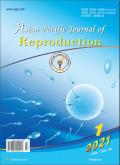对COVID-19母婴传播和预防措施的认识:孕妇的横断面研究
IF 0.6
Q4 REPRODUCTIVE BIOLOGY
引用次数: 0
摘要
目的:了解孕妇对新冠肺炎母婴传播和预防措施的认识、态度和做法,并确定犹豫接种疫苗的原因。方法:这项观察性横断面知识、态度和实践研究是在2020年10月至2021年3月在勒克瑙一家三级护理医院产前护理门诊就诊的任何妊娠期孕妇中进行的。为了获得所需信息,所有参与者都使用了一份经过预测试的半结构问卷进行了访谈。疫苗犹豫的原因也被要求评估他们不愿意接种疫苗的情况。结果:共包括652名孕妇,91.3%的孕妇知道新冠肺炎通过与感染者接触传播,85.3%的孕妇了解新冠肺炎通过呼吸道飞沫传播。在孕妇中,95.7%的人认为保持社交距离和佩戴适当的口罩是预防严重急性呼吸系统综合征冠状病毒2型感染的有效方法,96.8%的孕妇外出时定期佩戴口罩。在孕妇中,79.0%的人对接种疫苗犹豫不决。最常见的原因是新冠肺炎疫苗会伤害发育中的胎儿(77.5%),妊娠期不太安全(75.0%)。良好的意识将有助于防止未来新冠肺炎浪潮在印度发生。本文章由计算机程序翻译,如有差异,请以英文原文为准。
Awareness about transmission and preventive measures of COVID-19 from mother to child: A cross-sectional study among pregnant women
Objective: To study the knowledge, attitude, and practice of pregnant women regarding transmission and preventive measures of COVID-19 from mother to child and to determine the reasons for vaccine hesitancy. Methods: This observational cross-sectional knowledge, attitude, and practice study was conducted among pregnant women of any trimester, attending the antenatal care out-patient department of a tertiary care hospital in Lucknow from October 2020 to March 2021. All the participants were interviewed using a pretested semistructured questionnaire for desired information. Reasons for vaccine hesitancy were also asked to assess their unwillingness to get vaccinated. Results: Totally 652 pregnant women were included and 91.3% were aware that COVID-19 spread through contact with an infected person and 85.3% knew that COVID-19 spread by respiratory droplets. Of pregnant women, 95.7% perceived that social distancing and wearing a proper mask were effective ways to prevent SARS-CoV-2 infection and 96.8% of the pregnant women wore masks regularly when going out. Of pregnant women, 79.0% were hesitant to get vaccinated. The most common reason was that COVID-19 vaccine can harm the developing fetus (77.5%) and was not very safe in pregnancy (75.0%). Conclusions: Of the pregnant women, 22.92% have unsatisfactory knowledge regarding COVID-19, 35.63% have negative attitude and 19.93% have poor practices, indicating that there are still gaps in awareness, and majority of them are unwilling to get vaccinated. Good awareness will help prevent the occurrence of future COVID-19 waves in India.
求助全文
通过发布文献求助,成功后即可免费获取论文全文。
去求助
来源期刊

Asian Pacific Journal of Reproduction
Veterinary-Veterinary (all)
CiteScore
1.70
自引率
0.00%
发文量
588
审稿时长
9 weeks
期刊介绍:
The journal will cover technical and clinical studies related to health, ethical and social issues in field of Gynecology and Obstetrics. Articles with clinical interest and implications will be given preference.
 求助内容:
求助内容: 应助结果提醒方式:
应助结果提醒方式:


